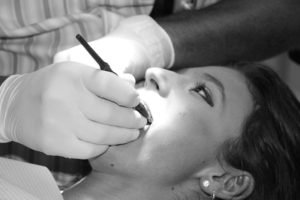Correlation between depression and periodontitis
Depression: According to the WHO, around 322 million people suffered from depression in 2015. That's 4.4 percent of the world's population. Ten years earlier, the figure was 18 percent lower. The illness not only restricts the mental well-being of those affected, but also causes considerable damage to employers. According to the German Federal Chamber of Psychotherapists, the proportion of absences due to mental illness increased steadily up to 2015. 13 percent of all days of incapacity for work were due to mental illness. This makes mental illnesses one of the most common causes of incapacity for work after musculoskeletal and respiratory illnesses. The Federal Ministry of Health estimates around 11 million days of incapacity to work per year. The financial losses for the economy and the state are enormous: Allianz and RWI record annual losses of 15.5 to 21.9 billion euros for the German economy.
Periodontitis promotes depression
 Whether post-traumatic stress disorder, constant stress or fear of loss - depression is closely interwoven with psychological factors. However, mental suffering is not the only trigger. It is not uncommon for depression to be linked to chronic inflammation. After all, biochemistry understands depression as a disorder of brain metabolism caused by inflammatory foci in the body. Researchers report an interplay between the messenger substances involved in inflammatory reactions and depression. This means that patients with chronic inflammatory diseases suffer from depression more frequently than average. However, it is not just multiple sclerosis or rheumatism that are being targeted. Periodontitis also appears to be closely linked to depressive illnesses.
Whether post-traumatic stress disorder, constant stress or fear of loss - depression is closely interwoven with psychological factors. However, mental suffering is not the only trigger. It is not uncommon for depression to be linked to chronic inflammation. After all, biochemistry understands depression as a disorder of brain metabolism caused by inflammatory foci in the body. Researchers report an interplay between the messenger substances involved in inflammatory reactions and depression. This means that patients with chronic inflammatory diseases suffer from depression more frequently than average. However, it is not just multiple sclerosis or rheumatism that are being targeted. Periodontitis also appears to be closely linked to depressive illnesses.
A recent scientific study provides the proof: dentists investigated the correlation between depression and periodontitis in groups of people with and without depressive symptoms. Depressed subjects were more likely to develop aggressive periodontitis than antidepressed subjects. At the same time, depressive patients showed a significantly higher concentration of pro-inflammatory substances in damaged gingival grooves than healthy patients, which can be explained primarily by psychologically induced dysfunctions of the immune system. The above-average inflammation levels also had a negative impact on wound healing. In depressed patients, the healing of treatment injuries was delayed many times over. Overall, the study shows a strong mutual influence between depression and periodontitis: periodontitis increases the risk of depression and, conversely, depression increases the risk of periodontitis.
